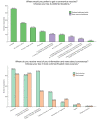Perceptions of, and Obstacles to, SARS-CoV-2 Vaccination Among Adults in Lebanon: Cross-sectional Online Survey
- PMID: 36383635
- PMCID: PMC9762140
- DOI: 10.2196/36827
Perceptions of, and Obstacles to, SARS-CoV-2 Vaccination Among Adults in Lebanon: Cross-sectional Online Survey
Abstract
Background: The COVID-19 pandemic is an additional burden on Lebanon's fragmented health care system and adds to its ongoing political, economic, and refugee crises. Vaccination is an important means of reducing the impact of the pandemic.
Objective: Our study's aims were to (1) assess the prevalences of intention to vaccinate and vaccine hesitancy in Lebanon; (2) determine how vaccine hesitancy in Lebanon varies by sociodemographic, economic, and geographic characteristics; and (3) understand individuals' motivations for vaccinating as well as concerns and obstacles to vaccination.
Methods: We performed a cross-sectional study from January 29, 2021, to March 11, 2021, using an online questionnaire of open- and closed-ended questions in Arabic via convenience "snowball" sampling to assess the perceptions of adults residing in Lebanon.
Results: Of the 1185 adults who participated in the survey, 46.1% (95% CI: 43.2%-49.0%) intended to receive the SARS-CoV-2 vaccine when available to them, 19.0% (95% CI 16.8%-21.4%) indicated they would not, and 34.0% (95% CI 31.3%-36.8%) were unsure (with an additional 0.9% skipping this question). The most common reasons for hesitancy were concerns about safety, limited testing, side effects, and efficacy. Top motivations for vaccinating were to protect oneself, protect one's family and the public, and end the pandemic. Despite financial hardships in Lebanon, barriers to vaccine access were not frequently described as concerns. Established health care facilities, rather than new temporary vaccination centers, were most frequently selected as preferred vaccination sites.
Conclusions: Vaccine hesitancy appears to be high in Lebanon. Disseminating clear, consistent, evidence-based safety and efficacy information on vaccines may help reduce vaccine hesitancy, especially among the large proportion of adults who appear to be unsure about (rather than opposed to) vaccination.
Keywords: COVID-19; Lebanon; SARS-CoV-2; coronavirus; health care system; misinformation; public health; vaccination; vaccine acceptance; vaccine hesitancy.
©Nadeem Elias Abou-Arraj, Diana Maddah, Vanessa Buhamdan, Roua Abbas, Nadine Kamel Jawad, Fatima Karaki, Nael H Alami, Pascal Geldsetzer. Originally published in JMIR Formative Research (https://formative.jmir.org), 14.12.2022.
Conflict of interest statement
Conflicts of Interest: None declared.
Figures


References
-
- Ritchie H, Ortiz-Ospina E, Beltekian D, Mathieu E, Hasell J, Macdonald B. Coronavirus Pandemic (COVID-19) Our World in Data. [2022-11-18]. https://ourworldindata.org/coronavirus .
-
- Bizri AR, Khachfe H, Fares M, Musharrafieh U. COVID-19 pandemic: an insult over injury for Lebanon. J Community Health. 2021 Jun;46(3):487–493. doi: 10.1007/s10900-020-00884-y. https://europepmc.org/abstract/MED/32661861 10.1007/s10900-020-00884-y - DOI - PMC - PubMed
-
- Kenner D. The struggle to keep Lebanon healthy. Institute of Current World Affairs. 2021. Apr 19, [2022-11-18]. https://www.icwa.org/the-struggle-to-keep-lebanon-healthy/
-
- ESCWA warns: more than half of Lebanon’s population trapped in poverty. United Nations ESCWA. 2020. Aug 19, [2020-12-12]. https://www.unescwa.org/news/Lebanon-poverty-2020 .
LinkOut - more resources
Full Text Sources
Miscellaneous

